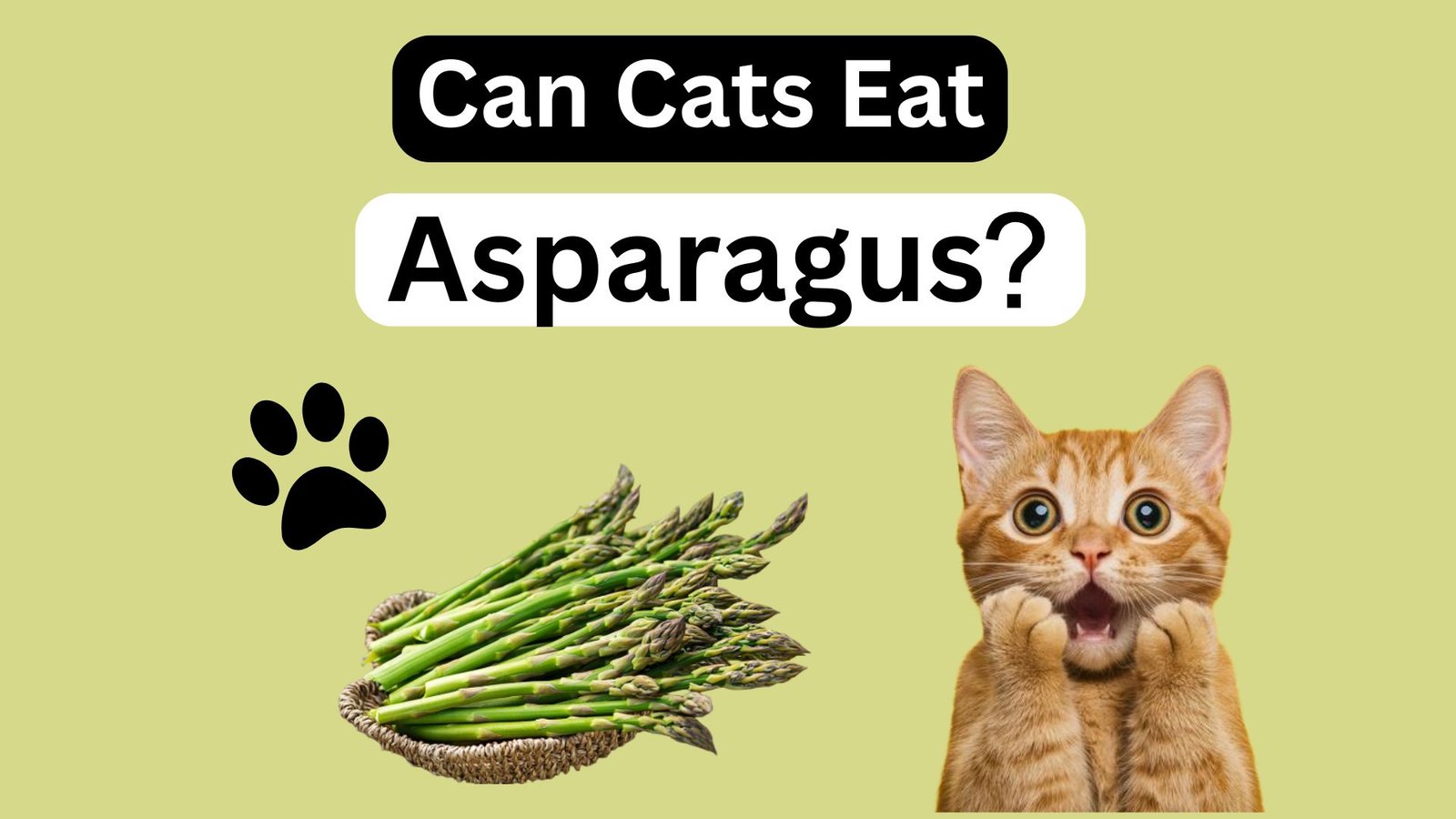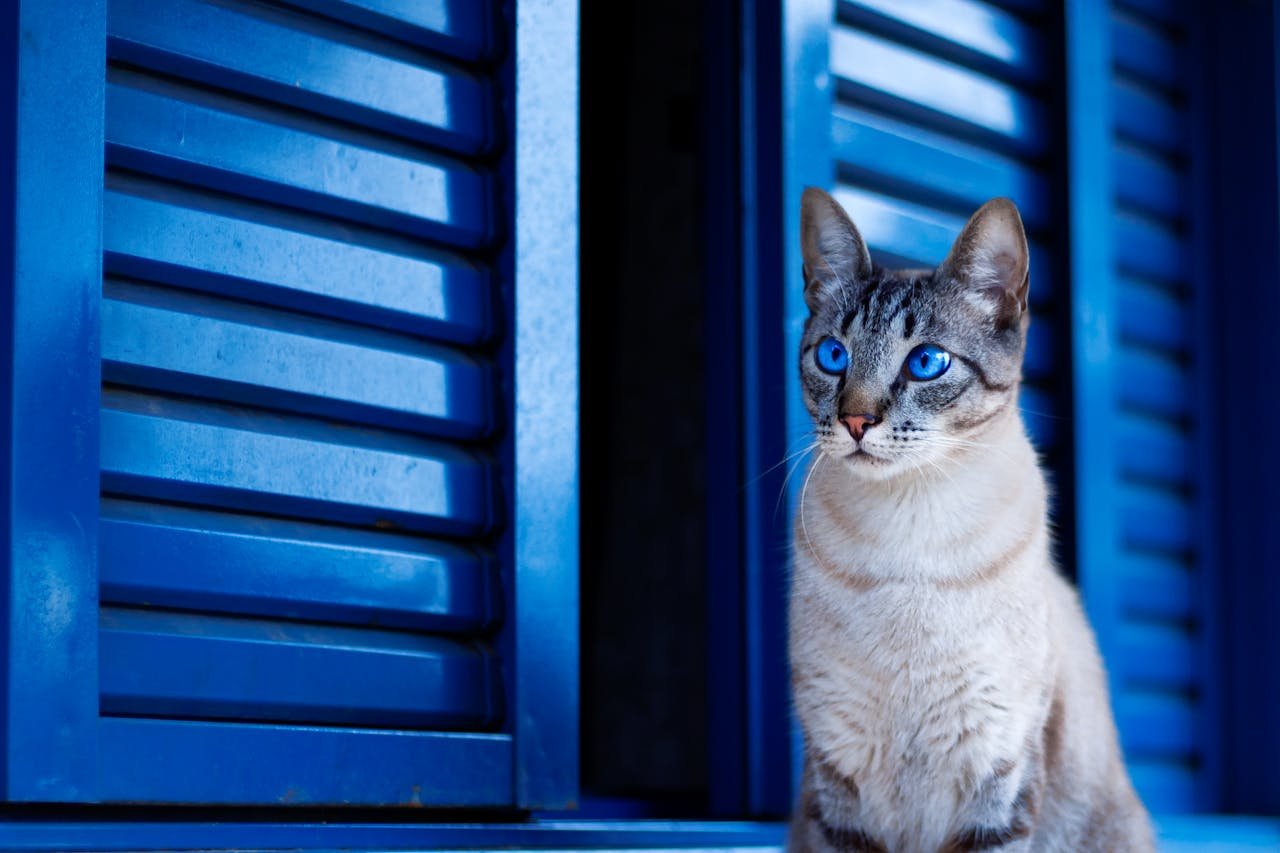Is Asparagus Safe for Cats? What Loving Owners Need to Know in 2025
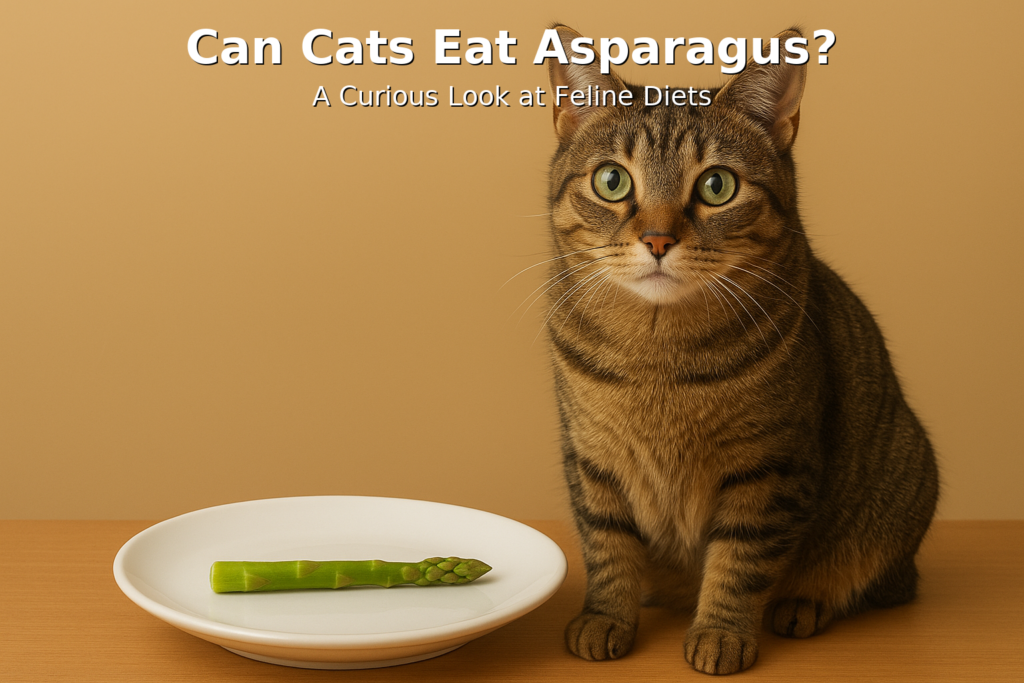
Many cat owners wonder: can cats eat asparagus safely? The answer is yes—this vegetable is not toxic to cats. However, since felines are obligate carnivores, they do not require vegetables in their diet.
A small piece of plain, cooked asparagus can provide fiber and vitamins that may support digestion and overall wellness. Still, moderation is key. Feeding too much asparagus may lead to stomach upset, diarrhea, strong-smelling urine, or even affect your cat’s urinary health over time.
If you do choose to share asparagus with your cat, make sure it is cooked, plain, and free of salt, butter, or spices. Raw asparagus should be avoided as it can be hard to chew and digest. Think of it as an occasional treat rather than a regular part of your cat’s meals.
Do Cats Like Asparagus?
Cats can be full of surprises when it comes to their food choices. While many turn away from fruits and veggies, some cats actually enjoy nibbling on asparagus. The main reason may be its texture, which can feel soothing on their gums—especially if they have mild gum irritation or dental issues.
Another possibility is instinctive behavior. Cats in the wild don’t eat vegetables, but they sometimes chew on grass to ease digestion or help expel parasites. Since asparagus is similar in appearance and texture, a cat’s curiosity or instinct might drive them to chew on it occasionally.
That said, cats are unpredictable—some may love a small bite of asparagus, while others may completely ignore it.
Is Asparagus Toxic to Cats?
It is not listed by the ASPCA or the Pet Poison Helpline as a common poison, which means a small bite is generally safe.
However, it’s very important to note that not all plants with “asparagus” in their name are safe. For example, the asparagus fern is toxic to cats and can cause vomiting, diarrhea, or skin irritation if ingested. Always make sure your cat only encounters the edible vegetable, not its toxic relatives.
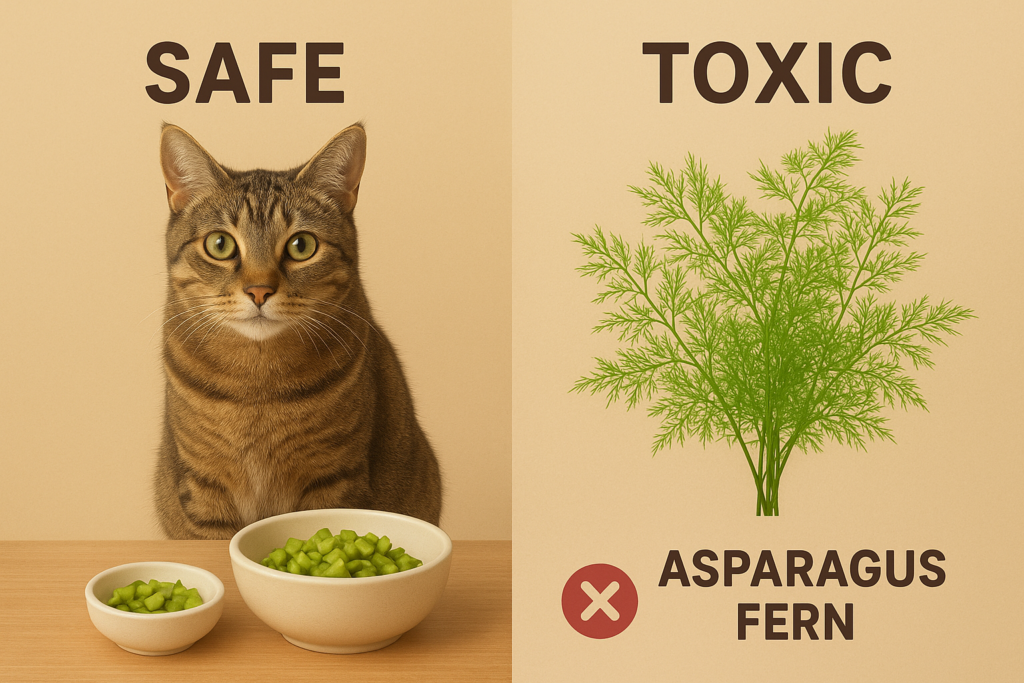
Even though asparagus is non-toxic, it should only be given occasionally and in moderation. Too much can upset your cat’s stomach or create urinary issues, so treat it as a rare snack rather than a regular part of their diet.
Cats and Asparagus: Nutritional Value and Risks
Cats can safely nibble on asparagus occasionally, but it should never be a regular part of their diet. Here’s what you need to know:
Nutritional Value
- Fiber: Supports digestion in small amounts, though cats’ digestive systems aren’t designed for plant fiber.
- Vitamins A, C, and K: Provide minor wellness support but are not essential for obligate carnivores.
- Potassium: Helps maintain proper cell, nerve, and muscle function.
Risks
- Digestive Upset: Too much fiber may cause vomiting, diarrhea, or gas.
- Urinary Health Concerns: Being alkaline, asparagus can alter urine pH. Cats prone to UTIs or struvite crystals should avoid it.
- Toxic Look-Alikes: Asparagus fern and other similar plants are harmful and should never be consumed.
If your cat is healthy and has no urinary issues, you can let them try a tiny bite of asparagus. Make sure it’s soft, plain, and cooked—just like a gentle treat from your hands. Offer only a small piece occasionally, and keep an eye on them for any changes in digestion or litter box habits. This way, you can share a little moment of curiosity and care with your furry friend safely.
Related Post: Can Cats Eat Vegetables? Safe Veggie Guide for Cat
Is Asparagus Good for Cats?
Asparagus can be a nutrient-rich addition to a cat’s curiosity bites, though cats are obligate carnivores and their main diet should come from animal-based proteins. It’s low in calories and packed with essential vitamins and minerals, making it safe for occasional small servings if your cat shows interest.
Health Benefits of Asparagus for Cats
- Supports Digestion: High in dietary fiber, asparagus can help with constipation, diarrhea, and even move hairballs through the digestive tract.
- Asparagus is naturally low in calories yet rich in fiber, which can help your cat stay satisfied for a longer time. This makes it a gentle addition for cats that need help managing extra weight.
- Rich in Nutrients:
- Vitamin C: Boosts the immune system
- Vitamin A: Supports vision
- Vitamin K: Helps prevent blood clotting
- Folate: Supports muscle function
- Vitamin C: Boosts the immune system
Nutritional Breakdown of Asparagus for Cats (90g Cooked)
- Calories: 20
- Protein: 2.2 g
- Fat: 0.2 g
- Fiber: 1.8 g
- Vitamin C: 12% of the RDI
- Vitamin A: 18% of the RDI
- Vitamin K: 57% of the RDI
- Folate: 34% of the RDI
- Potassium: 6% of the RDI
- Phosphorus: 5% of the RDI
- Vitamin E: 7% of the RDI
How Much Asparagus Can You Feed Your Cat?
If it’s your cat’s first time trying asparagus, always start with a tiny amount and observe their reaction. While raw asparagus is safe, boiled or steamed asparagus is easier for them to chew and digest. Never add salt, butter, or spices, as these can be harmful to your cat.
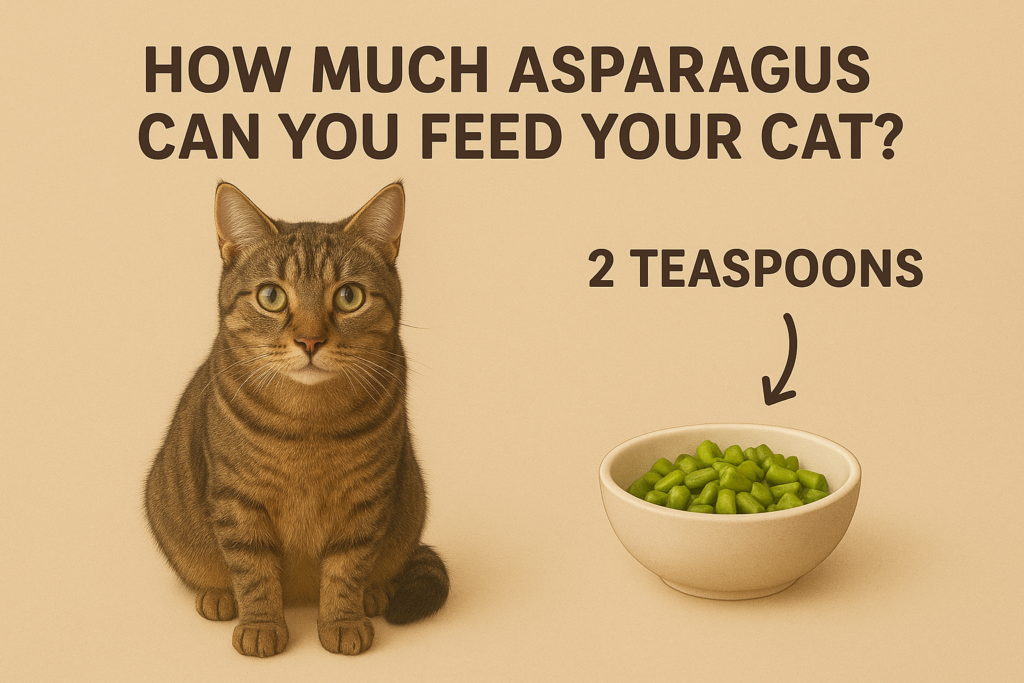
Even though a whole cooked asparagus spear has only 3 calories, it’s recommended to limit the serving to 2 teaspoons. This is because asparagus has a high alkaline content, which can affect the pH of your cat’s urine, potentially leading to bladder issues.
Tips for serving asparagus safely:
- Introduce it as a tiny treat rather than a meal replacement.
- Follow the 90/10 rule: 90% of nutrition from regular cat food, 10% from treats (including asparagus).
- Always monitor your cat for any digestive changes or unusual litter box behavior.
Potential Side Effects of Feeding Asparagus to Cats
While asparagus is safe for most cats in tiny amounts, overfeeding or offering it to sensitive cats can lead to some side effects. It’s important to know the risks so you can keep your furry friend healthy.
Common side effects include:
- Digestive Upset: High fiber content may cause diarrhea, gas, or stomach discomfort if eaten in large amounts.
- Urinary Concerns: Since asparagus has alkaline properties, it may influence your cat’s urine pH and potentially contribute to urinary tract issues.
- Allergic Reactions or Sensitivity: Rarely, cats may show signs of allergies such as vomiting, itching, or unusual behavior.
How To Prepare Asparagus for Your Cat
Feeding your cat asparagus can be safe and enjoyable if prepared properly. Cats can try raw or cooked asparagus, but cooking it is usually the best choice to prevent choking and make it easier to chew.
Ways to serve asparagus to cats:
- Raw Asparagus: Tough and stringy, raw asparagus can be hard for cats to chew. If offering raw, chop the tender tips into very small, bite-sized pieces.
- Cooked Asparagus: Well-cooked asparagus is softer and easier for cats to chew. You can sauté stems on medium heat without oil or lightly boil them. Avoid any seasoning.
- Steamed Asparagus: Add a few stems to boiling water and steam until softened. Let it cool, then serve in small pieces alongside cat food.
Important Tips:
- Always cut asparagus into bite-sized pieces.
- Serve sparingly as an occasional treat, not a regular part of the diet.
- Never season with salt, garlic, onion, or any spices, as these are toxic to cats.
What Are the Risks if Your Cat Overeats Asparagus?
Feeding asparagus in small amounts is usually safe, but if your cat eats too much, it can trigger some unwanted side effects:
- Upset Stomach
Consuming too much asparagus can lead to nausea, loose stools, or noticeable uneasiness in cats. - Digestive Issues
Since cats are obligate carnivores, their bodies are not designed to process high fiber. Large amounts of asparagus can lead to bloating, gas, or indigestion. - Unpleasant Urine Odor
Asparagus contains sulfur compounds that can make your cat’s urine smell much stronger than usual.
Which Cats Should Not Eat Asparagus?
Not every cat can safely enjoy asparagus. Here are the types of cats that should avoid it:
Cats with Digestive Sensitivity
If your cat frequently experiences stomach issues, asparagus can exacerbate the problem due to its high fiber content. It may trigger diarrhea, gas, or vomiting.
Cats with Allergies
Some cats can be allergic to asparagus. Signs may include itching, swelling, or unusual behavior after eating it. If you notice these symptoms, stop feeding immediately.
Cats with Special Dietary Needs
If your cat requires a strict meat-based diet, adding too many vegetables like asparagus can disrupt their nutritional balance.
Can Cats Eat Raw Asparagus?
Yes, cats can technically eat raw asparagus, but it isn’t the best choice for them. Raw asparagus is high in fiber and can be tougher to chew, making it harder for cats to digest compared to lightly cooked asparagus. While it does retain more vitamin C when uncooked, this isn’t a real benefit for cats since their bodies naturally produce their own vitamin C.
Feeding raw asparagus to cats in large amounts may cause:
- Digestive upset such as bloating, diarrhea, or vomiting.
- Chewing difficulty, especially for younger or senior cats.
- No added nutritional value, since cats don’t rely on plant-based nutrients.
If you want to offer asparagus as an occasional treat, it’s safer to give your cat small, cooked, and plain pieces instead of raw.
Can Cats Eat Asparagus Ferns?
No — cats should never eat asparagus ferns. Instead, it is a popular ornamental houseplant that is considered mildly toxic to cats according to the Pet Poison Helpline.
If your cat ingests any part of the plant — especially the berries or foliage — it may lead to:
- Vomiting and diarrhea
- Abdominal pain or discomfort
To keep your cat safe, always ensure asparagus ferns are kept out of reach or, ideally, not kept indoors at all.
Interesting Facts About Asparagus
Asparagus isn’t just another green vegetable—it carries a long history and some surprising facts that many people don’t know:
- Name Origin: The word asparagus comes from the Greek word meaning “shoot” or “sprout.” Its Latin name is Asparagus officinalis.
- Slow to Grow: Unlike many vegetables, asparagus plants take patience. From seed to the first harvest, it can take up to three years before the stems are ready.
- Global & Local Fame: While China is the largest producer of asparagus worldwide, the United States is home to the self-proclaimed “Asparagus Capital of the World” in Oceana County, Michigan.
These facts show how special asparagus is—not just as food but also as part of culture and history.
Related Post: Can Cats Eat Rambutan? A Pet Parent’s Safety Guide
Final Thoughts
Cats may safely nibble on asparagus in moderation, but it should never replace their primary protein-based diet. While the vegetable isn’t toxic, too much fiber or tough stems can upset a cat’s stomach. Always serve asparagus as an occasional treat, keep portions small, and avoid feeding asparagus ferns since they are toxic to cats.
Vegetables like asparagus can add variety, but they should only complement—not compete with—the nutrition your cat truly needs.
FAQs About Cats and Asparagus
Is asparagus safe for cats?
Yes, asparagus is safe for cats in small amounts, but it should only be given as an occasional treat.
Can cats eat raw asparagus?
They can, but raw asparagus is tough to chew and digest. Cooked, plain asparagus is easier for cats.
Are asparagus ferns toxic to cats?
Yes. Asparagus ferns are poisonous to cats and can cause vomiting, diarrhea, and skin irritation.
What happens if my cat eats too much asparagus?
Overeating may cause stomach upset, gas, or diarrhea because of the high fiber content.
How should I serve asparagus to my cat?
Serve it plain, soft-cooked, and in tiny pieces without salt, butter, or seasoning.
For More Visits: SiameseMania
Also Read: Can Cats Eat Blackberries? Safety, Health Perks & Feeding Tips 2025
